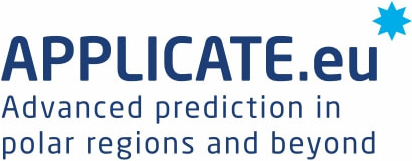4. May 2021
While knowledge coproduction between climate scientists and climate information users has become a common theme in the climate services discourse, the interface between climate service providers […]
24. February 2021
We compare the mass budget of the Arctic sea ice for 15 models submitted to the latest Coupled Model Intercomparison Project (CMIP6), using new diagnostics that […]
27. December 2020
Forecasts with the European Centre for Medium‐Range Weather Forecasts’ numerical weather prediction model are evaluated using an extensive set of observations from the Arctic Ocean 2018 […]
16. December 2020
Increased human activity in the Arctic calls for accurate and reliable weather predictions. This study presents an intercomparison of operational and/or high-resolution models in an attempt […]
16. December 2020
Increased human activity in the Arctic calls for accurate and reliable weather predictions. This study presents an intercomparison of operational and/or high-resolution models in an attempt […]
5. December 2020
Polar amplification – the phenomenon where external radiative forcing produces a larger change in surface temperature at high latitudes than the global average – is a […]
5. December 2020
The Earth System Model Evaluation Tool (ESMValTool) is a community diagnostics and performance metrics tool designed to improve comprehensive and routine evaluation of Earth system models […]
16. October 2020
This special collection gathers a series of studies highlighting the impact of polar observations on predictive skill in polar regions and beyond, from weather to climate […]
24. August 2020
The Alfred Wegener Institute Climate Model (AWI‐CM) participates for the first time in the Coupled Model Intercomparison Project (CMIP), CMIP6. The sea ice‐ocean component, FESOM, runs […]
30. July 2020
The Earth System Model Evaluation Tool (ESMValTool) is a community diagnostics and performance metrics tool designed to improve comprehensive and routine evaluation of Earth system models […]
17. April 2020
We examine CMIP6 simulations of the Arctic sea‐ice area and volume. We find that CMIP6 models produce a wide spread of mean Arctic sea‐ice area, capturing […]
1. June 2019
Paper describing the main characteristics of the CNRM-CM6-1, the coupled global climate model developed jointly by CNRM and CERFACS for the CMIP6, and comparing its simulated […]
2. April 2019
In this report we present an assessment of the use of atmospheric observations in the Arctic, and their impact on the ECMWF analysis and short-range forecasts, […]
25. March 2019
Polar amplification – the phenomenon where external radiative forcing produces a larger change in surface temperature at high latitudes than the global average – is a […]
30. October 2018
Interest in seasonal predictions of Arctic sea ice has been increasing in recent years owing, primarily, to the sharp reduction in Arctic sea-ice cover observed over […]
12. October 2018
8. August 2018
The polar prediction problem is inherently multidisciplinary and requires cooperation across a wide community. Thus, an international group of agencies specifically designed a 10-day training course to bring […]
